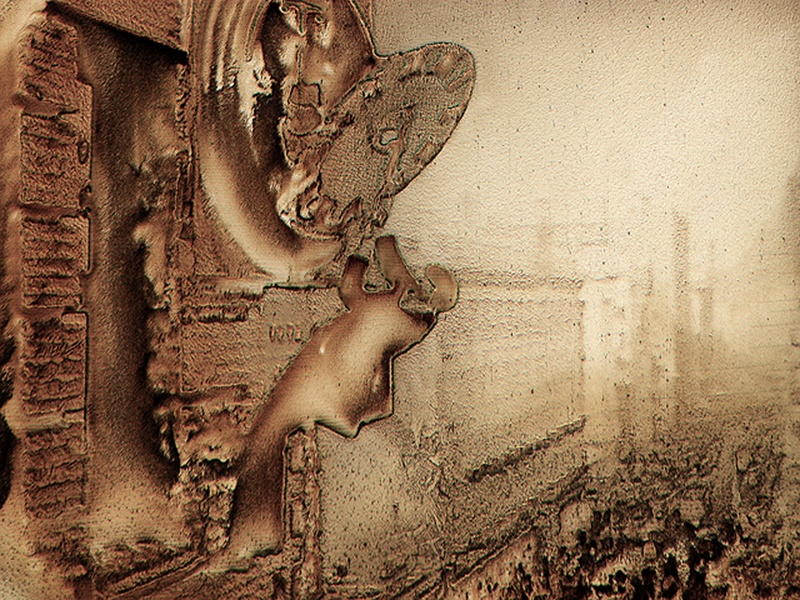Phil Solomon thinks contemporary movies are too clear-cut. In a lecture on the subject of his film, "American Falls," at the Carpenter Center on Thursday, Solomon suggested that filmmakers should strive to incorporate more abstract images in their works. Solomon himself is an expert in this realm; as an experimental filmmaker, he has built a reputation around the use of film emulsions and other chemical processes to add textures and nuances to many of his works. The film is a montage of fictional and non-fictional images representing pivotal moments of American history that have been chemically treated to create a unique visual effect. The images, which were originally an installation in the Corcoran Gallery, have since been turned into a film in which they overlap and fade into one another to create a rhythm and present a survey of history that is also a social commentary on the future of the country.
"American Falls" was commissioned by Paul Roth, senior curator and director of photography and media arts at the Corcoran Gallery of Art in Washington, D.C., who invited Solomon to tour the Corcoran after seeing one of his works at the New York Film Festival. Upon his initial visit to the gallery, Solomon was especially captivated by two works: Frederic E. Church’s famous painting, "Niagara," and Jennifer Steinkamp’s "Loop," a digital installation in the rotunda of the gallery with a seven-second loop pattern.
"With six projectors overlapping, expertly put in the architecture, Steinkamp’s work really transformed the place, and I became extremely interested in such multi-screen pieces," Solomon said in an interview with The Crimson. The war memorials in D.C. also had a big influence on Solomon. "The Korean War memorial thrilled me because of its photographic nature. It looked like my films—it had this kind of grainy texture from the rock," Solomon says. Solomon’s inspirational trip to the nation’s capital helped him craft a vision for "American Falls," a triptych installation.
As Solomon made clear in his presentation, the finished product is more than a simple patriotic survey of American history. Indeed, the chemical processing techniques that Solomon employs immediately offer a conflicted and sometimes criticizing reflection of our nation’s past and present. "Because it was a public work, I wanted to work with iconography. I tried to be as least ambiguous as I could in terms of picking the images," Solomon says. "However, I wanted to replenish, or redeem, or criticize the iconography in fresh ways. The chemical treatments serve this purpose. This film is not a neat montage. I want to say very direct things, but I also want to make it ambiguous and offer different readings," Solomon says.
Equally interesting in Solomon’s work is the choice of musical scores. His complex, chemically treated images are supplemented with conflicting sounds that are simultaneously soothing and threatening. Solomon attributes this inspiration for this complexity to the legendary Charles Ives, an American composer of the 20th century.
"Charles Ives was a significant influence in my work. He quotes popular tunes in his compositions, yet he transforms them in a way that reveals their underlying darkness. My work is very much the same," Solomon says. "On the surface, many may misread my piece as glorifying and patriotic, much like the initial impression some may have of Ives’s works. However, underneath the patriotism, there is this underlying dissonance."
Audience members were very receptive to Solomon’s work. Attendee Sophie Jacobs says, "I especially appreciated [Solomon’s] chemical treatments to enhance the images." Citing a series of images of the founding fathers, Jacobs says, "The chemical treatments made it look as if the founding fathers were on fire, almost invoking the wrath and fury of the Founding Fathers if they could see the state of our country today."
With the completion of "American Falls," Solomon hopes to produce a work on the subject of Stan Brakhage, a world-renowned experimental filmmaker. Brakhage was also a long-time colleague and friend of Solomon. "I collected over 150 hours of footage of our master classes, and it was a great privilege to experience that. Now, 10 years after his death, it weighs on me to do something," Solomon says. Solomon also hopes to do more work with video games including the Grand Theft Auto series. He remains unsure if chemical treatments will continue to be a big part of his future works. However, regardless of his future endeavors, it is clear that chemical tampering represents an integral component of the identity of his work, used in many of his pieces. Solomon says, "The chemistry allows for things to be not just the denotative—it allows for images to be connotative. This is expression."
Read more in Arts
Still Our Favorite "Little Women"Recommended Articles
-
Beloved Lab Administrator To Retire in DecemberLenny Solomon, singer, songwriter, and lab administrator, will retire this coming December after 38 years as the research program manager for Harvard’s Anderson Research Group.
-
Harvard Overseer Launches into SpaceStephanie D. Wilson ’88, a member of the Harvard Board of Overseers, launched into space for the third time yesterday ...
-
 Johnson Delivers Late Victory on Senior Day
Johnson Delivers Late Victory on Senior Day -
Harvard Turns 350The festivities, which drew 44,000 attendees, were part of one of the largest and most extravagant birthday parties the country has ever seen and brought together members of the Harvard community from the class of 1918 to the Class of 1990.
-
Looking in the MirrorIt is nothing short of demeaning to hear that I could not possibly care about repairing the world because of my Orthodox faith.
-
Apocalypse Later?No matter its source, the goal of preventing a dictator from using chemical weapons on his own people is a just one.














